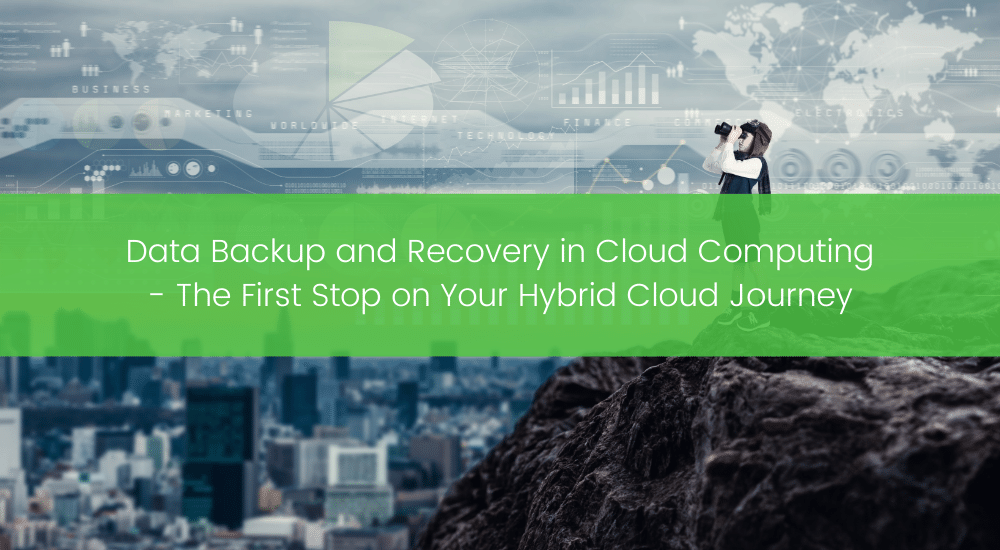
It’s no secret that digital transformation has become a critical component of successfully managing business operations, and tech leaders in all industries prioritize it as a business imperative. Many companies face a dilemma when it comes to handling exploding data volumes, legacy infrastructure, and data compliance. Adding to that, the ongoing pandemic has created a profound sense of urgency to modernize digital business infrastructures.
Gartner recently reported that using a “cloud-smart approach helps to balance cloud adoption with the organization’s unique circumstances, goals, and business values.” As such, establishing a smart cloud strategy should be prioritized without reverting to cookie-cutter solutions or bundled cloud packages.
The Critical First Step When Assessing Hybrid Cloud Adoption
The critical first step towards moving into hybrid cloud adoption is the utilization of cloud-based Data Backup and Recovery (BaaS). In a world filled with ransomware and interruptions—it’s essential to maintain access to business-critical data. Ramifications from a single ransomware attack can lead to devastating circumstances if a proper data backup and recovery strategy is not in place.
Strategists estimate that a single ransomware attack can destroy data costing an average of $622,569 in remediation costs. Some businesses may be so heavily impacted by downtime that they may never recover from an attack.
Data volumes continue to increase globally, with over 44 zettabytes collected this year alone. Protecting these massive quantities of data can be challenging, if not an impossible endeavor. As a result, companies are moving to hybrid cloud strategies to help manage the vast amounts of data collected in order to ensure compliance with PII, PCI, and HIPAA standards. A hybrid cloud strategy offers the flexibility to determine where data should live depending upon its level of sensitivity, making it an ideal solution for organizations with data living in different environments.
Data, the Black Gold of the Future
The future of successful business will be determined by their ability to respond to market demands using agile solutions while developing disruptive innovations. Data is arguably the most critical asset businesses possess. Harnessing the power of Hybrid Cloud for its uses, analytics, and storage capabilities will help determine the success of organizations of all sizes.
Today’s fast-paced world creates consumer expectations for instant gratification. Systemic issues related to inaccessibility, latency, or lost/stolen data will cause consumers to revert to trusted and less interactive experiences. BaaS, as a hybrid cloud solution, remains a significant component for creating agile and accessible data solutions to solve these issues.
All organizations should practice their due diligence when building a hybrid cloud roadmap to ensure the challenges of performance, cost, security, and data workload capabilities are addressed. Many companies turn to managed service providers to navigate the complexities surrounding various cloud capabilities and security issues inherent in cloud deployments.
Managed service providers can help identify your digital business components and workloads that appropriately match the flexibility of the hybrid cloud. Experts can provide the guidance necessary to establish a cloud migration strategy and provide services for digital transformation support. This partnership can reduce the burdens often faced by in-house IT teams allowing them to stay focused on key business initiatives.
Let TBC Guide Your Hybrid Cloud Migration Strategy
TBConsulting offers managed service provider solutions with specializations in IT systems, software, data storage options, security monitoring, and more. We work alongside your organization’s CIO and IT teams to help you manage IT operations. Whether you’re looking to replace the functionality of outdated legacy infrastructure or need a partner to help evaluate your current environment—TBC can provide the tools necessary to help your company thrive and succeed.
TBC identifies your systems, workloads, data storage, and applications within your digital environment for viability to optimize in the cloud. We provide fully managed solutions for companies looking to optimize a pandemic driven business model while alleviating the burden placed on in-house IT employees.
To learn more about how TBC can help address your current organizational needs, check out our most recent content: The Ultimate Guide for Transitioning to the Hybrid Cloud.
.png)

